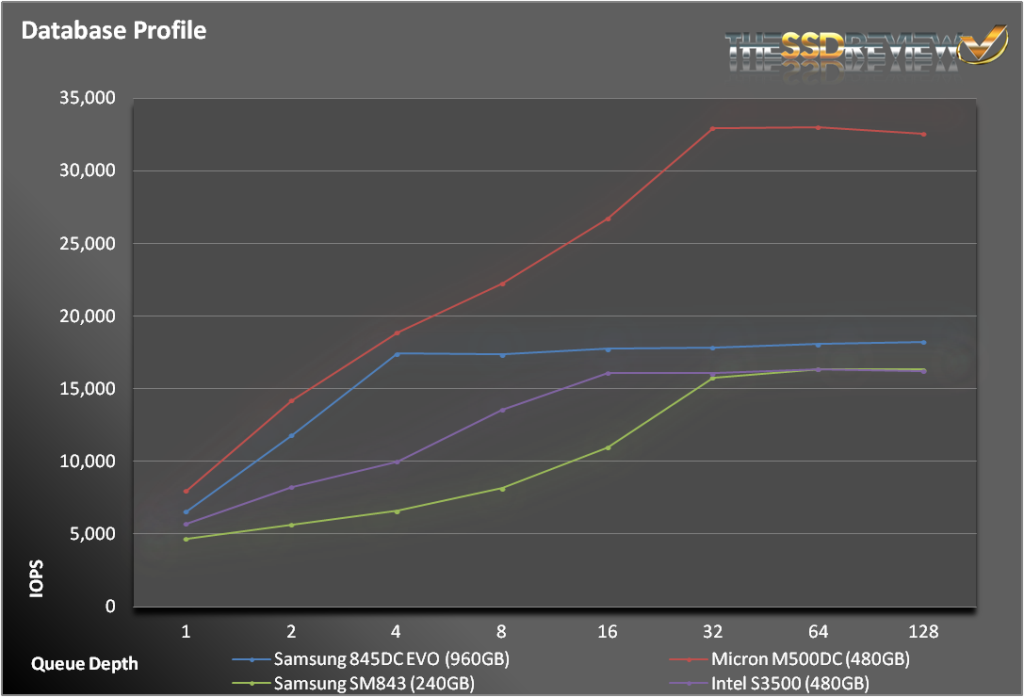SERVER PROFILES
While synthetic workloads do a great job of testing the underlying technology and reporting easy to understand results, they aren’t always indicative of how the drive will be used by the end user. Workloads that simulate enterprise environments try to bridge that gap without being overly complex.
The database profile is 8K transfers, and 67% percent of operations are reads.
In our database profile testing, the 845DC outperformed its predecessor, but was no match for the excellent random write performance of the Micron M500DC.

The fileserver profile is based on an 80% read/20% write mix. Its made up of blocksizes from 512 to 64K, each making up a different percentage of the access pattern. The pattern is: 512 bytes=10%, 1k=5%,2k=5%, 4k=60%, 8k=2%, 16k=4%, 32k=4%, 64k=10%.
With the fileserver profile, the same general trend occurred. It just isn’t quite fair when the M500DC has double the random write performance.

The webserver profile is similar to the fileserver profile, but has some additional 128K and 512K accesses thrown in for good measure. Additionally, the profile is 100% reads.
The Samsung drives have a clear advantage here over the competition because of their read performance. This is the type of workload that Samsung is designing for and the performance of these drives back it up. The 845DC fell slightly short of the SM843, but both had great showings.
FINAL THOUGHTS
The biggest piece to this puzzle is pricing. Samsung is always aggressive with their consumer pricing and we have seen a similar trend with their enterprise products. Realistically, for this product to really undercut the competition, it needs to be less than $0.75/GB. As we have seen, the only tangible differences between this and the 840 EVO is a little bit of board area, some capacitors and and a few discrete components, which should make that price an easy goal to hit. This chart was sent by Samsung just post review and provides their pricing model for the 845DC EVO:
With that said, the Samsung 845DC EVO is one of the best pure read SSDs that we have tested. Random read IOPS were off the charts for this category of SSDs. The same can be said for write operations too. Samsung was able to take the success of the SM843 and build on its performance. The stability and consistency of the 845DC was on par with much more expensive SSDs. The addition of power-loss protection pushes this drive into an area where it can truly be used in servers and data centers.

We really do like the cadence that Samsung is using with their consumer and enterprise products. Seed the consumer market with new technology, wait for it to mature and then make an enterprise product. It’s plain to see that Samsung had enterprise in mind when they released the 840 EVO, the board layout for the 845DC aligned too well and was just too convenient.
If you are looking for an enterprise SSD that gives you enterprise features, excellent read performance and very good write performance at a great price, look no farther than the Samsung 845DC EVO.
 The SSD Review The Worlds Dedicated SSD Education and Review Resource |
The SSD Review The Worlds Dedicated SSD Education and Review Resource | 

Do you think that they will release a 2-bit MLC version as well in the near future? it seems logical right now that Samsung will soon update its MLC 840 Pro and enterprise equal.
I dont see this but have nothing to back my view. I just think the reality of SSD lifespan coupled with low pricing trumps all.